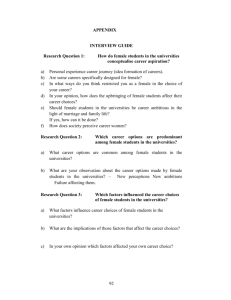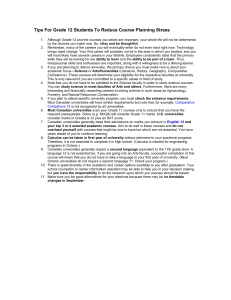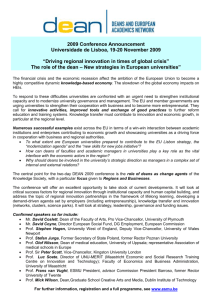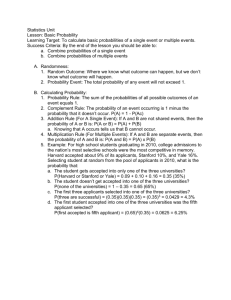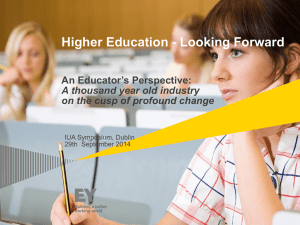Seminar 3 -“The politics of representation in future
advertisement
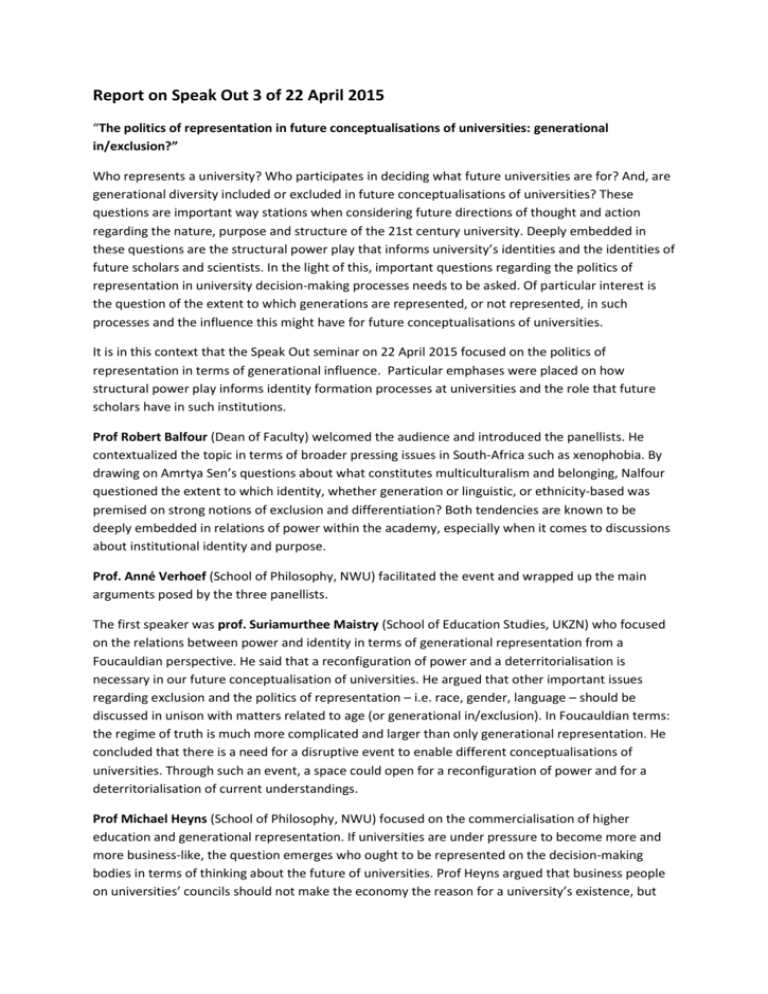
Report on Speak Out 3 of 22 April 2015 “The politics of representation in future conceptualisations of universities: generational in/exclusion?” Who represents a university? Who participates in deciding what future universities are for? And, are generational diversity included or excluded in future conceptualisations of universities? These questions are important way stations when considering future directions of thought and action regarding the nature, purpose and structure of the 21st century university. Deeply embedded in these questions are the structural power play that informs university’s identities and the identities of future scholars and scientists. In the light of this, important questions regarding the politics of representation in university decision-making processes needs to be asked. Of particular interest is the question of the extent to which generations are represented, or not represented, in such processes and the influence this might have for future conceptualisations of universities. It is in this context that the Speak Out seminar on 22 April 2015 focused on the politics of representation in terms of generational influence. Particular emphases were placed on how structural power play informs identity formation processes at universities and the role that future scholars have in such institutions. Prof Robert Balfour (Dean of Faculty) welcomed the audience and introduced the panellists. He contextualized the topic in terms of broader pressing issues in South-Africa such as xenophobia. By drawing on Amrtya Sen’s questions about what constitutes multiculturalism and belonging, Nalfour questioned the extent to which identity, whether generation or linguistic, or ethnicity-based was premised on strong notions of exclusion and differentiation? Both tendencies are known to be deeply embedded in relations of power within the academy, especially when it comes to discussions about institutional identity and purpose. Prof. Anné Verhoef (School of Philosophy, NWU) facilitated the event and wrapped up the main arguments posed by the three panellists. The first speaker was prof. Suriamurthee Maistry (School of Education Studies, UKZN) who focused on the relations between power and identity in terms of generational representation from a Foucauldian perspective. He said that a reconfiguration of power and a deterritorialisation is necessary in our future conceptualisation of universities. He argued that other important issues regarding exclusion and the politics of representation – i.e. race, gender, language – should be discussed in unison with matters related to age (or generational in/exclusion). In Foucauldian terms: the regime of truth is much more complicated and larger than only generational representation. He concluded that there is a need for a disruptive event to enable different conceptualisations of universities. Through such an event, a space could open for a reconfiguration of power and for a deterritorialisation of current understandings. Prof Michael Heyns (School of Philosophy, NWU) focused on the commercialisation of higher education and generational representation. If universities are under pressure to become more and more business-like, the question emerges who ought to be represented on the decision-making bodies in terms of thinking about the future of universities. Prof Heyns argued that business people on universities’ councils should not make the economy the reason for a university’s existence, but must see the economy only as the context which helps to create space for a university to exist for its own unique reasons. The third speaker was prof. Petro du Preez (School of Education Studies, NWU) whom focused on the politics of generational representation in higher education from a posthumanist perspective. She emphasised that universities should not negate fundamental thinking and questioning to instantly solve problems. Universities should keep on evolving and transforming, because a university as a concept creates meaning, receive meaning and is capable of annihilate meaning. She framed this reasoning by using the concept of “plasticity” as postulated by the philosopher Catherine Malabou. Du Preez argued that exploring “plasticity” could enable us to ask new and uncomfortable questions in rapidly changing university contexts. The evening concluded with a lively discussion during which the audience asked some pertinent questions to enable thought processes with regard to future conceptualisations of universities and particularly in terms of generational representation. Other issues raised by the audience related to the continued economic inequality in South Africa, the need for universities to prepare students for the challenges (xenophobia, racism, violence) in South Africa, and the general lack of transformation (not only of universities) in South Africa after apartheid. Anné Verhoef

